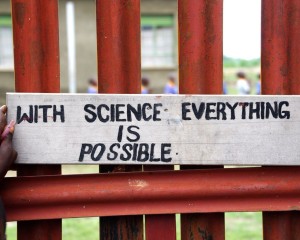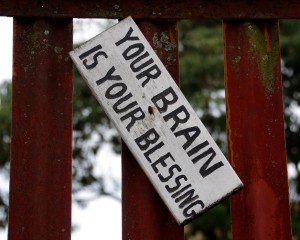At Kasese Humanist Primary School (KHPS) in Uganda the students have a formal debate once a week. One debate I witnessed as a teacher there had the proposition: “Science has done more harm than good in our country today.” Science, for the sake of this debate, included technology. Usually at these debates the kids make their arguments and the teachers only jump in sometime near the end – but not this time. This time the teachers started things off. And I was asked to go second.
A Humanist School in a Fundamentalist Country

Before I relate the position I took, I should explain the nature of the situation in Uganda. I was volunteering with KHPS as part of Pathfinders Project, an international humanist service year. KHPS is a humanist school in a coercively religious nation. On national exams students must answer questions like “Who created you?”. The US Christian right has been instrumental in the passing of the so-called “Kill the Gays” bill. Businesses have names like “God’s Mercy Dairy.” And Joseph Kony’s LRA, of Kony 2012, fame stands for “The Lord’s Resistance Army” which, at least officially, fights to make Uganda a theocracy. In this climate, KHPS must balance teaching humanist ideals which challenge this foundation and not alienating the community that relies on them.
How does humanism manifest at KHPS? For one thing, they hold weekly humanism seminars. I can’t comment on what goes on normally during these seminars, but the Pathfinders lead several while we were there and we had sessions about cooperation, empathy, the platinum rule, critical thinking, and the scientific method. More generally, the school emphasizes science classes. There are signs all over campus with sayings like “educate your children through science for a better future,” “do not believe in superstition”, and “science is the best way to live.” Their motto is “With Science We Can Progress.”

Many of the students, but certainly not all or even a majority, call themselves humanists. I don’t know what their regular religion classes previously focused on, but while I taught them we emphasized studying comparative religions. The students had never heard of any traditions other than Christianity and Islam. While I made it clear thatthe purpose of studying different religions was to understand and empathize with others, a humanist tenet, the students made comments questioning the scientific validity of polytheism, meditation, or prophecy.
Cultural Perceptions of “Science”
It was clear that humanism, and its associate science, had been presented as an alternative to Christianity and Islam. Which of course it often is, though not necessarily. At another humanist school we volunteered at in Uganda (there are three), the teachers who called themselves humanists also identified as Muslim or Christian. Their humanism was not instead of religion, but in addition to it.
In the KHPS climate,

I fully expected the identified humanist, and most vocal, teachers to be strong advocates for science in the debate. But before I unveil some of their positions I should mention one other thing. While these were formal debates, the students were not encouraged to argue a side for the sake of argument. Students and teachers alike argued from their conscience only. For my part, I decided to play devil’s advocate and argue for why science and technology has done harm in Uganda. Being the second person to make a case following another Pathfinder, I did not know that I was actually adding to the chorus of agreement with the proposition.
What I had not yet realized was how science was tied to colonialism in the Ugandan’s minds. Science and technology was brought by colonial powers. I need to make clear that I am using the word “science” because they did, but really they were talking more about technology than the scientific method or a particular theory.

And a narrow definition of technology that includes modern machines and western medicine but excludes traditional tools.
The fruits of scientific labor in Uganda largely remain the domain of outsiders. Many of the technologies that have come to Uganda function to better strip the land of its natural resources to be exported to the West. Not only is this striping the land of its beauty, but Ugandans are seeing little profit from it. Can it really be surprising that these so-called advances are viewed unfavorably by the Ugandans?
Humanism and Colonialism
In and of itself, this rejection of modern technology is not surprising, expected even. But coupled with the school’s intensive promotion of science as a tenet of humanism the rejection not only surprised me, it seemed hypocritical. Following the debate I began to think about humanism not just in relation to Christianity and Islam, but in relation to colonial Christianity and Islam. Then it started to make sense.
In my experience encountering humanism, mostly in the US, it is framed as a moral structure for nonbelievers. Good without god.

This is not an automatic dichotomy, but it is often presented as such. When I arrived in Uganda I brought this assumption that humanism would also be set up as opposition to theistic religions. From talking to the teachers at the humanist school my assumptions were confirmed, mostly.
There were a few things that confused me as our time marched forward at KHPS. One of the teachers was evangelically humanist and very vocally anti-religion. Yet at lunch he prayed and told us he was talking to “the one who knows.” He told me a story about the mountain god – the god of his tribe (the word he himself used). When the god was angry his tribe suffered from droughts. When the god was happy it rained. How was this behavior coming from a man who is an avowed humanist scientist? How are these beliefs coming from a man who is constantly asking his students, “Where does God live? Have you ever seen him?”
Following the debate I realized I’d forgotten the colonial history of the area. I cannot be sure how this teacher would describe his beliefs about his tribe’s mountain god, but I don’t think he’d call it religion. Just as he embraces science at the same time that he rejects western medicine (during the debate he explained how western medicine takes your money and only kills you while herbal medicines are natural and work), this teacher also embraces his mountain god at the same time that he rejects religion.

He embraces science when it rejects colonial religion and rejects science when it rejects African independence or indigenous power. It’s not about science at all. Nor about religion. It’s about colonialism and reestablishing autonomy.
For these teachers, science is part of the problem as it continues to perpetuate the legacy of colonialism. But at the same time they are able to embrace science as a way of rejecting colonial-imposed religion.
There is no reason to argue that their rationale for embracing humanism is any less valid than anyone else’s. KHPS very existence is a rebellion against forced religious belonging. They are teaching their students to meet the world with a critical eye. Their humanism might not encompass the same beliefs about science and technology as mine does, but their humanism manifests with the same desire to instill critical thinking and generate justice. I can only hope our influence led them to more emphasize compassion and empathy for others in their humanism studies.
This piece was originally published with Applied Sentience. You can read this week’s post here. Do check it out for more photos.
